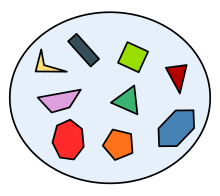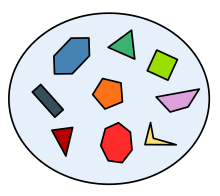

In mathematics, a set is a collection of different[1] things;[2][3][4] these things are called elements or members of the set and are typically mathematical objects of any kind: numbers, symbols, points in space, lines, other geometrical shapes, variables, or even other sets.[5] A set may have a finite number of elements or be an infinite set. There is a unique set with no elements, called the empty set; a set with a single element is a singleton.
Sets are uniquely characterized by their elements; this means that two sets that have precisely the same elements are equal (they are the same set).[6] This property is called extensionality. In particular, this implies that there is only one empty set.
Sets are ubiquitous in modern mathematics. Indeed, set theory, more specifically Zermelo–Fraenkel set theory, has been the standard way to provide rigorous foundations for all branches of mathematics since the first half of the 20th century.[5]
- ^ Cite error: The named reference
Cantorwas invoked but never defined (see the help page). - ^ P. K. Jain; Khalil Ahmad; Om P. Ahuja (1995). Functional Analysis. New Age International. p. 1. ISBN 978-81-224-0801-0.
- ^ Samuel Goldberg (1 January 1986). Probability: An Introduction. Courier Corporation. p. 2. ISBN 978-0-486-65252-8.
- ^ Thomas H. Cormen; Charles E Leiserson; Ronald L Rivest; Clifford Stein (2001). Introduction To Algorithms. MIT Press. p. 1070. ISBN 978-0-262-03293-3.
- ^ a b Halmos 1960, p. 1.
- ^ Stoll, Robert (1974). Sets, Logic and Axiomatic Theories. W. H. Freeman and Company. pp. 5. ISBN 9780716704577.